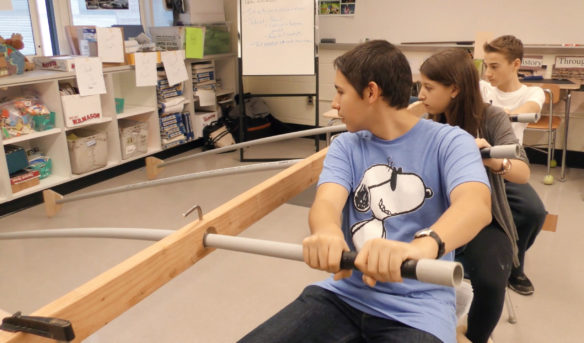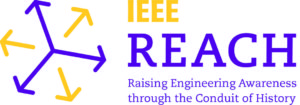
Students from Laurie Bisconti’s 8th-grade world history class at Heritage Middle School in Livingston, N.J., simulate Athenian oarsmen from the 8th century B.C.E. This hand-on lesson helps students understand the large impact technology has had and continues to have on civilizations.
Submitted photo by Kelly McKenna
By Kelly M. McKenna
k.mckenna@ieee.org
Over the course of time, engineering and technology have influenced our world socially, economically, politically and culturally. From the invention of the wheel to the many complex technological inventions and advancements of today, the intertwined relationship between engineering, technology and the rest of society is undeniable.
Social studies teachers understand this concept, they know that technology does not exist in a vacuum, and that technology and the humanities are not mutually exclusive, but rather interdependent. Through the lens of history, the IEEE REACH Program – Raising Engineering Awareness through the Conduit of History – brings these two fields of study together and combines them into educational resources that are available free to social studies teachers across the nation.
 REACH is a public imperative program of the nonprofit IEEE the world’s largest technical professional organization dedicated to advancing technology for the benefit of humanity. The IEEE History Center, located at Stevens Institute of Technology in Hoboken, N.J. is dedicated to the preservation of, research into and dissemination of information on the history of engineering and technology and is responsible for the program’s development. REACH is also supported by the IEEE Foundation.
REACH is a public imperative program of the nonprofit IEEE the world’s largest technical professional organization dedicated to advancing technology for the benefit of humanity. The IEEE History Center, located at Stevens Institute of Technology in Hoboken, N.J. is dedicated to the preservation of, research into and dissemination of information on the history of engineering and technology and is responsible for the program’s development. REACH is also supported by the IEEE Foundation.
The REACH Program offers a new lens for students to view history, one that focuses on how technology and engineering have impacted society throughout time. The goal of the program is to engage students in the history of technology and encourage the examination of its relationship to society, politics, economics, and culture; to enhance student skills in problem solving, critical thinking, research, communication and collaboration; and, ultimately, to prepare students to become better informed citizens of our high-tech society.
Designed in a college, career and civic life – or C3 – inquiry design format, the REACH Program is available free on the REACH website. The educational resources available include:
- informative background information for teachers;
- full inquiry units (including formative tasks and printed documents for use in the classroom);
- primary source materials;
- hands-on-activities; and
- short engaging videos that may be used either in the classroom or viewed outside of the classroom in a flipped-classroom environment.
Working with an academic advisory panel and a secondary education curriculum consultant, the program was designed to meet the needs of teachers. The target audience for the program is high school world history teachers and students, but other social studies teachers have expressed an interest, from geography and U.S. history teachers to those who work in an interdisciplinary fashion with their STEM educators. Middle school teachers also have used the REACH Program.
The REACH website may be found here. Sign-up is required to see all the free materials available on the site, but the information will not be shared with any third parties. There are only three inquiry units available now, but more inquiry units will be posted throughout the year.
The IEEE History Center will request feedback from teachers who pilot the program in their classrooms. To be considered for a pilot, there is a “Pilot-Program” sign-up page on the website, found in the “About” section.
To view REACH being implemented in the classroom, check out these two videos, Greek Triremes-Democracy and Empire and Early Maritime Navigation-Preeminence and the Power of the Sea.
Kelly M. McKenna is the REACH program manager with the IEEE History Center, located at Stevens Institute of Technology in Hoboken, N.J.



Leave A Comment